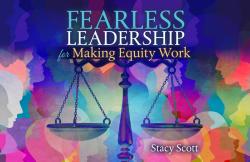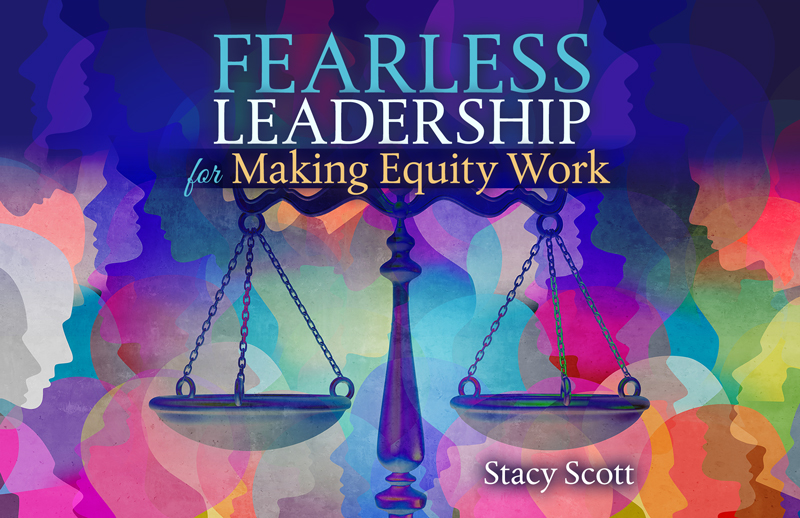Fearless Leadership for Making Equity Work
Author(s): Stacy Scott
Edition: 1
Copyright: 2021
Fearless Leadership for Making Equity Work highlights lessons for leaders focused on how to get results through proven practices that are intended to help create the needed breakthroughs in education in the US, including:
- Creating and adapting processes is a norm for a learning system. Capturing this energy, codifying it, and ensuring that it evolves are the work of effective leadership. This requires planning, strategy, and tools for effective implementation.
- Destabilization is their best hope for not settling on a plateau that is short of the system’s goal. This means tackling the tough issues, the areas where inequity and barriers to learning exist.
- Getting results requires that capacity is built focused on the most important needs identified for the system.
Leadership, with an eye to the horizon, has to see what the next level of challenge and possibility is and engender effort to meet the needs of the future effectively. In doing so, effective organizational practice makes possible the breaking of current barriers in public education. Such breakthroughs are sorely needed. Improvement not only has to become the norm but it also has to be driven by systems, models, and practices that manage change. Even success has its down-side because eager and diligent practitioners can settle into a mode of practice that should be temporary. This book is a leadership guide to managing equity in education. The writing methodology is a study guide that is an easy read, including case studies in call- out boxes and templates for easy implementation of the strategies.
Introduction
Chapter 1 Equity
Chapter 2 Vision Making And Guiding Principles
Chapter 3 Improvement Process
Chapter 4 Managing Reform
Chapter 5 Building Capacity
Chapter 6 Building an Effective System and Destabilizing Systems
Chapter 7 Cultural Analysis
Chapter 8 Designing New Systems and Processes (Basic Innovation)
Chapter 9 Assessing Districts
Chapter 10 Equity Audits
Chapter 11 Equity Proficiency Check
Chapter 12 Equity Operationalized - Strategic Planning
Conclusion
Epilogue
Dr. Scott is President of the Center for Understanding Equity and Global Sustainable, Inc. Dr. Scott has had an extensive career beginning as a teacher in middle school level and director of diversity; as a psychologist, training, coaching and consulting to schools and their leadership; and, finally as a superintendent and associate superintendent of schools. Dr. Scott’s first book and signature workshop named Making Equity Work were the focus of numerous workshops and seminars for many years. Dr. Scott’s work in shaping the nature of education and schools in Massachusetts and nationally began with his role as a Member of the Massachusetts State Board of Education, appointed by Governor William Weld and has continued for the past 30 years.
Dr. Scott is Senior Lecturer in Educational Leadership and Policy Studies at Boston University’s Wheelock School of Education and Human Development. He teaches strategic planning and governance as well as a course on cross-cultural storytelling. He is developing a new course on equity in community development. Dr. Scott has been involved in a variety of programs that support superintendent development including the AASA Urban Superintendent Academy which is run in collaboration with Howard University. Currently, Dr. Scott directs the aspiring superintendents of color training program, Influence 100, for the State of Massachusetts. Training adult learners, principals and superintendents in graduate and certification programs has been a standard offering by Dr. Scott for many years, locally and nationally.
Currently, Dr. Scott supports a variety of entrepreneurial social programs through Global Sustainable such as The Peace Institute, Inversant, Inc. and The Henry Buckner School. He supports a variety of research and design projects focused on intuition, confidence and storytelling (Spirit of Wonder). He is still into music though not performing professionally of late.
Fearless Leadership for Making Equity Work highlights lessons for leaders focused on how to get results through proven practices that are intended to help create the needed breakthroughs in education in the US, including:
- Creating and adapting processes is a norm for a learning system. Capturing this energy, codifying it, and ensuring that it evolves are the work of effective leadership. This requires planning, strategy, and tools for effective implementation.
- Destabilization is their best hope for not settling on a plateau that is short of the system’s goal. This means tackling the tough issues, the areas where inequity and barriers to learning exist.
- Getting results requires that capacity is built focused on the most important needs identified for the system.
Leadership, with an eye to the horizon, has to see what the next level of challenge and possibility is and engender effort to meet the needs of the future effectively. In doing so, effective organizational practice makes possible the breaking of current barriers in public education. Such breakthroughs are sorely needed. Improvement not only has to become the norm but it also has to be driven by systems, models, and practices that manage change. Even success has its down-side because eager and diligent practitioners can settle into a mode of practice that should be temporary. This book is a leadership guide to managing equity in education. The writing methodology is a study guide that is an easy read, including case studies in call- out boxes and templates for easy implementation of the strategies.
Introduction
Chapter 1 Equity
Chapter 2 Vision Making And Guiding Principles
Chapter 3 Improvement Process
Chapter 4 Managing Reform
Chapter 5 Building Capacity
Chapter 6 Building an Effective System and Destabilizing Systems
Chapter 7 Cultural Analysis
Chapter 8 Designing New Systems and Processes (Basic Innovation)
Chapter 9 Assessing Districts
Chapter 10 Equity Audits
Chapter 11 Equity Proficiency Check
Chapter 12 Equity Operationalized - Strategic Planning
Conclusion
Epilogue
Dr. Scott is President of the Center for Understanding Equity and Global Sustainable, Inc. Dr. Scott has had an extensive career beginning as a teacher in middle school level and director of diversity; as a psychologist, training, coaching and consulting to schools and their leadership; and, finally as a superintendent and associate superintendent of schools. Dr. Scott’s first book and signature workshop named Making Equity Work were the focus of numerous workshops and seminars for many years. Dr. Scott’s work in shaping the nature of education and schools in Massachusetts and nationally began with his role as a Member of the Massachusetts State Board of Education, appointed by Governor William Weld and has continued for the past 30 years.
Dr. Scott is Senior Lecturer in Educational Leadership and Policy Studies at Boston University’s Wheelock School of Education and Human Development. He teaches strategic planning and governance as well as a course on cross-cultural storytelling. He is developing a new course on equity in community development. Dr. Scott has been involved in a variety of programs that support superintendent development including the AASA Urban Superintendent Academy which is run in collaboration with Howard University. Currently, Dr. Scott directs the aspiring superintendents of color training program, Influence 100, for the State of Massachusetts. Training adult learners, principals and superintendents in graduate and certification programs has been a standard offering by Dr. Scott for many years, locally and nationally.
Currently, Dr. Scott supports a variety of entrepreneurial social programs through Global Sustainable such as The Peace Institute, Inversant, Inc. and The Henry Buckner School. He supports a variety of research and design projects focused on intuition, confidence and storytelling (Spirit of Wonder). He is still into music though not performing professionally of late.


